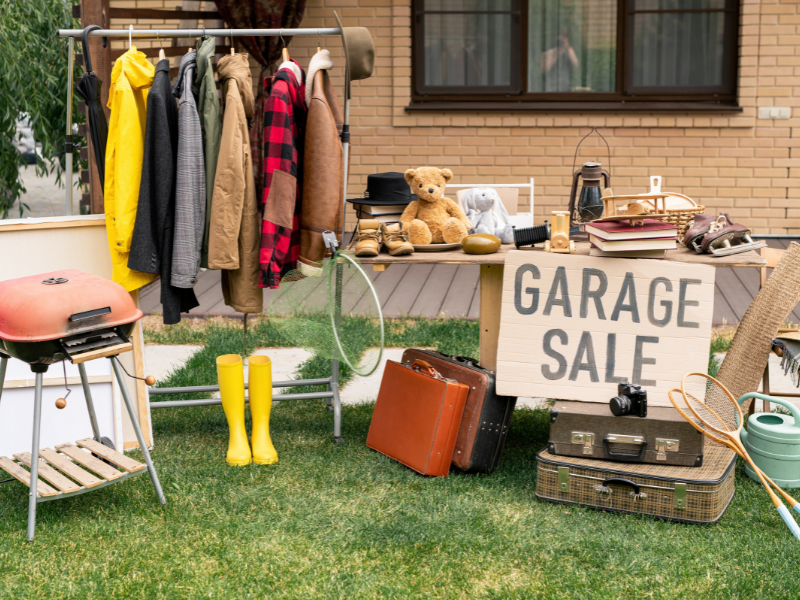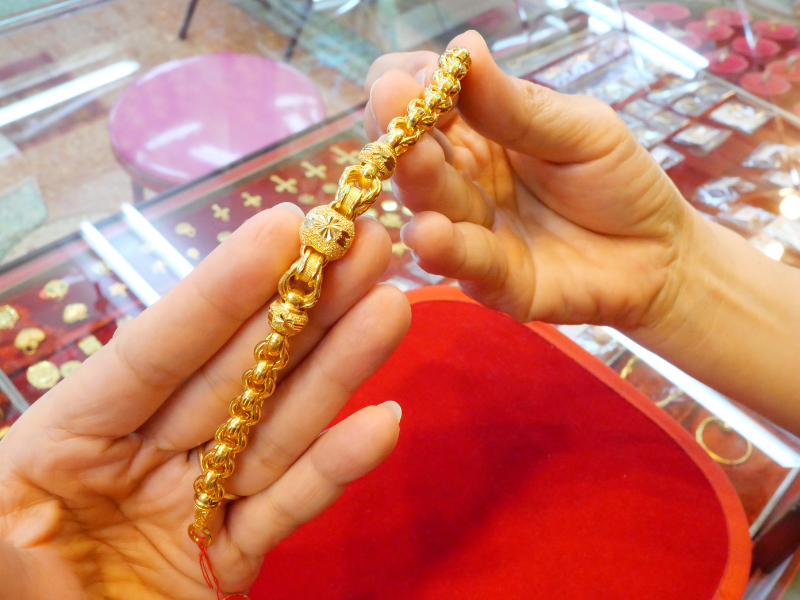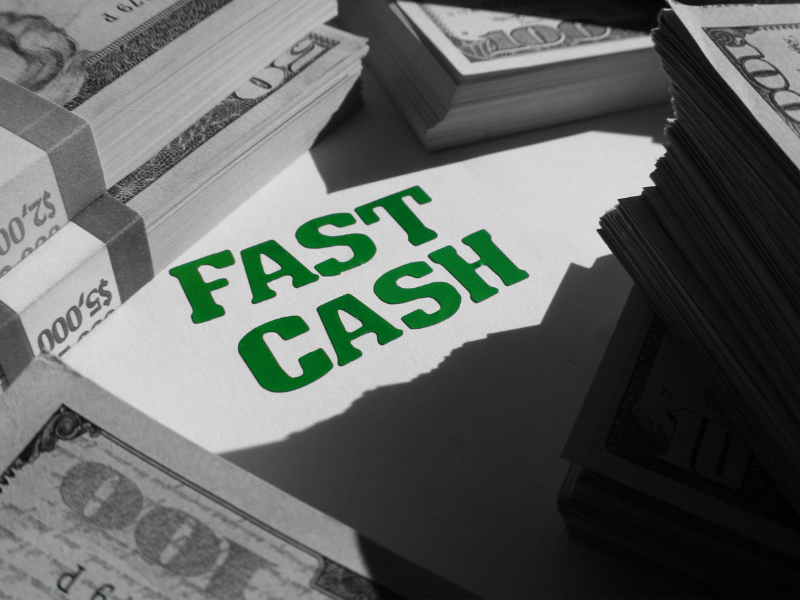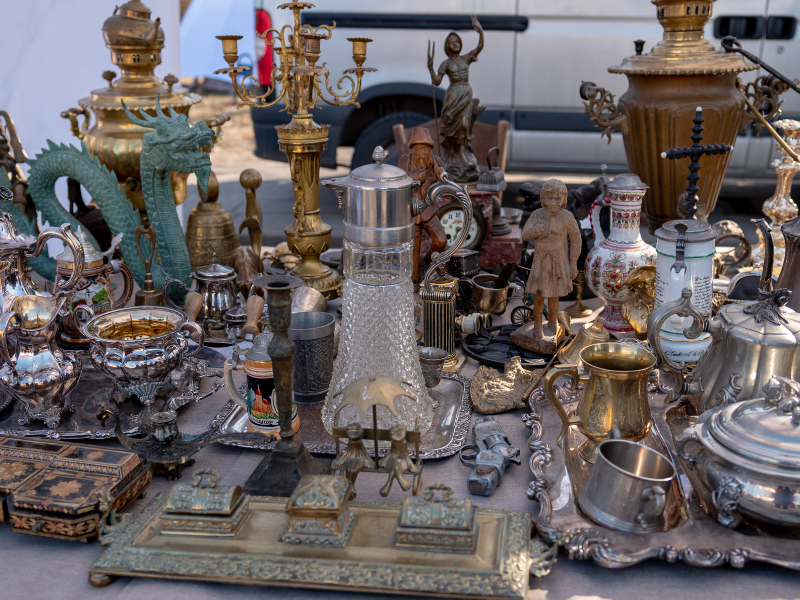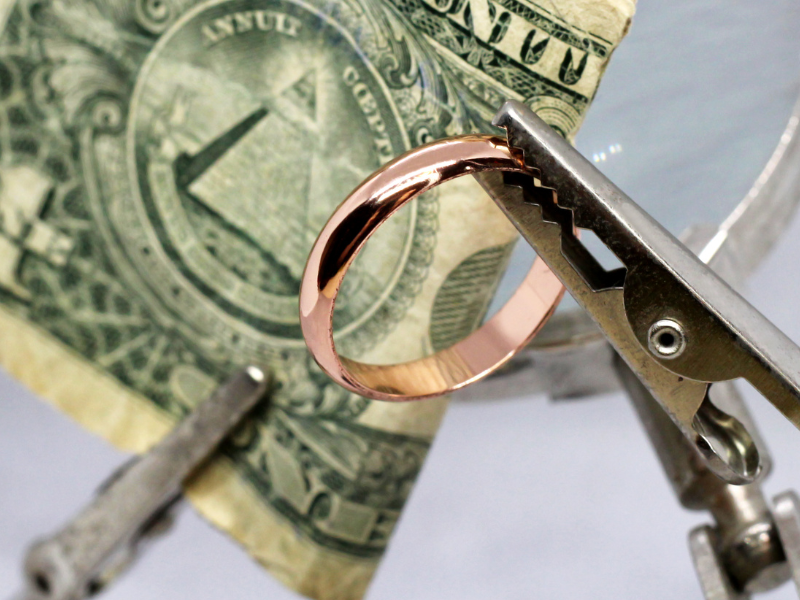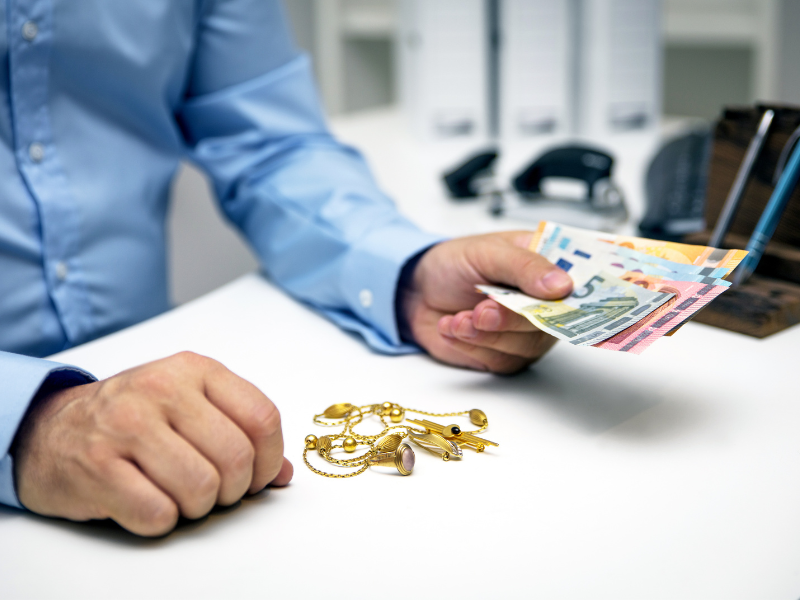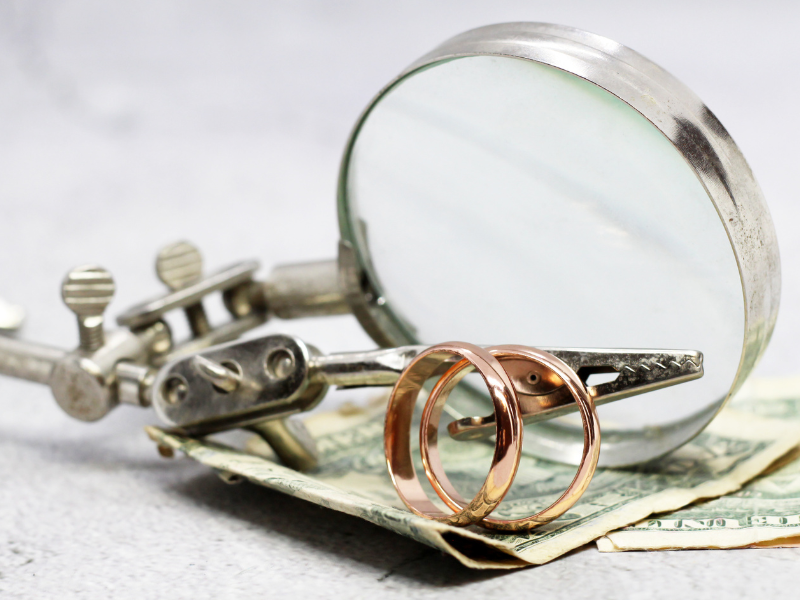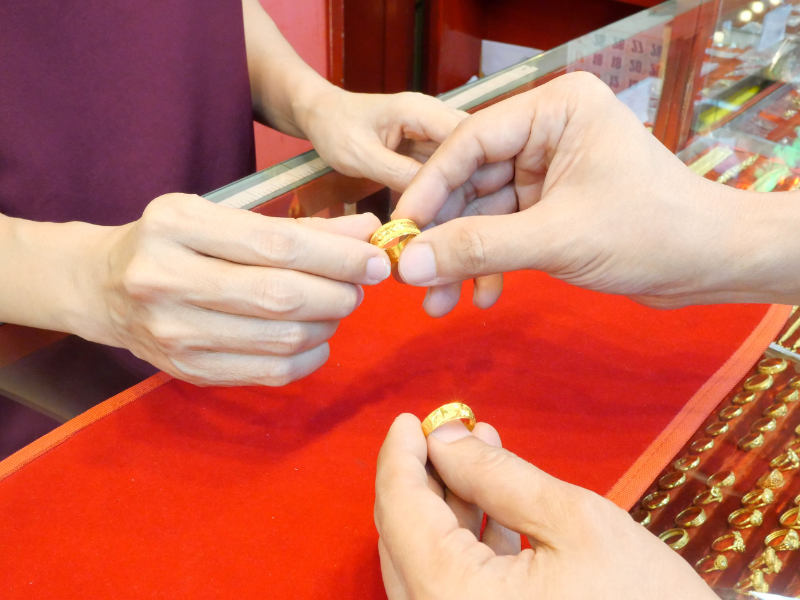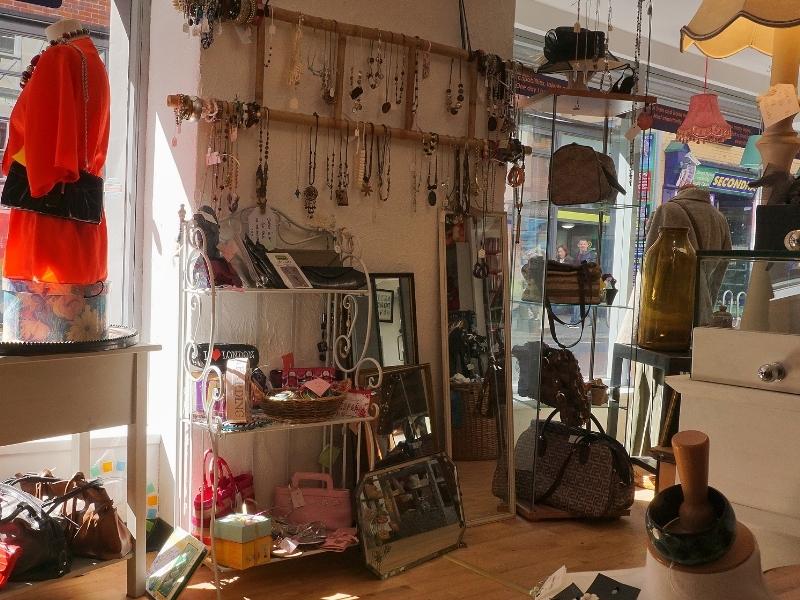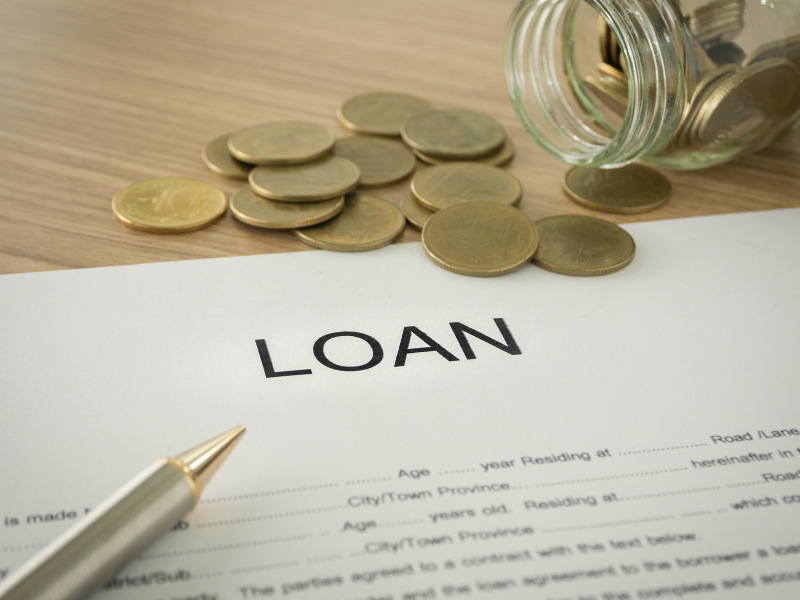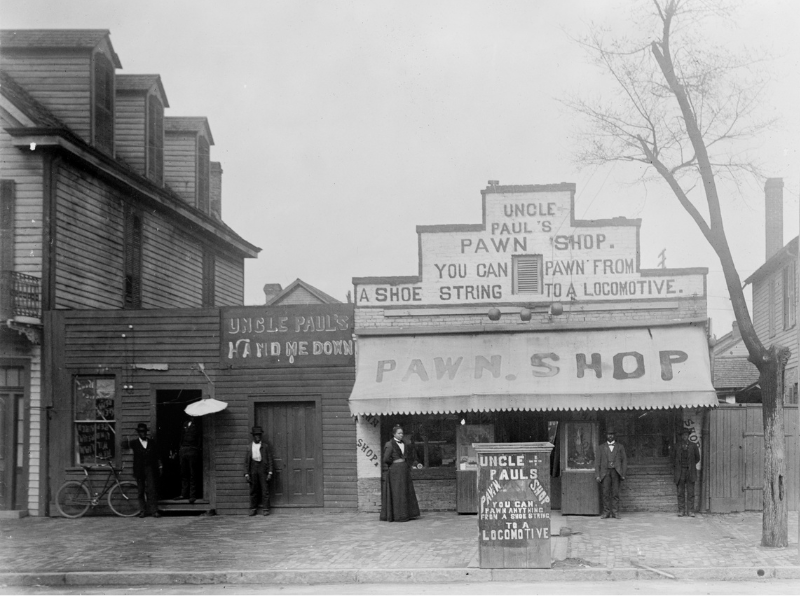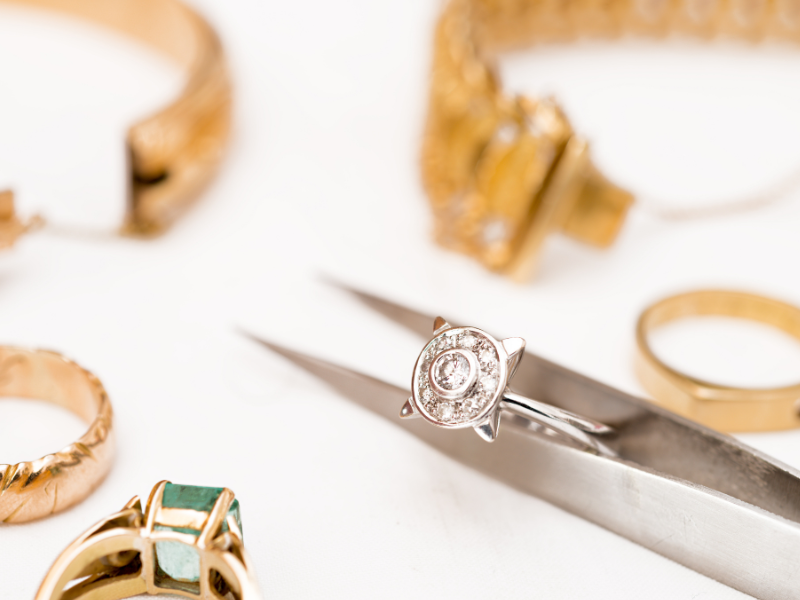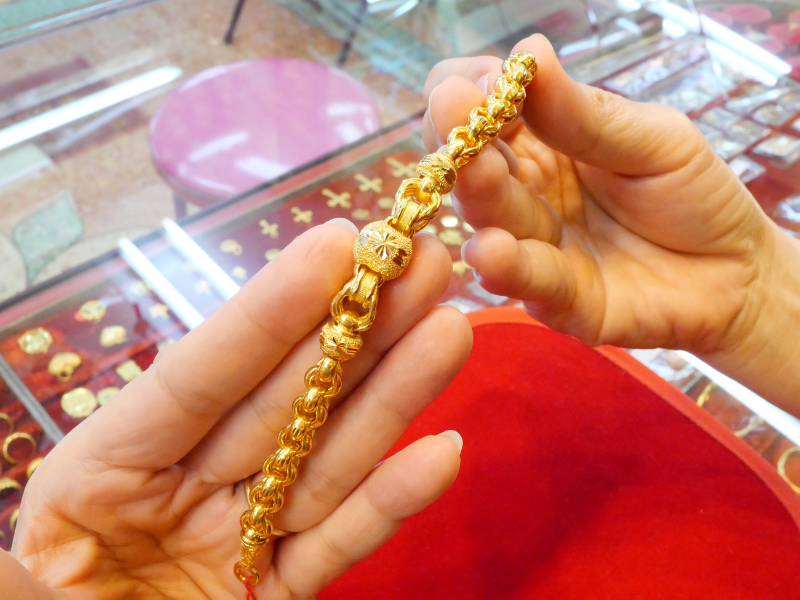BlogThursday, December 01 2022
Pawn Shop vs. Garage Sale Over time, we collect things. From knick-knacks to abandoned power tools, these extra items take up space and add to the general clutter in our home. They build up dust and collect cobwebs. Sometimes, they even get in the way of new items we need and want for our homes. When you have extra clutter in your home, you have options. You can throw out unwanted items. You can also turn those items into cash with a garage sale or take them to a pawn shop. Which is the best option for you? Let’s break it down. Garage Sales Sometimes called “rummage sales” or “yard sales,” garage sales take place when a resident sells personal and home items they no longer need. They may hold the sale in whole or part in their garage or carport or utilize the driveway or yard, hence the various names. Garage sales are popular for both sellers and buyers for a variety of reasons, including,
Pawn Shops Pawn shops have been a popular way to offload unneeded items for centuries. They have even funded human exploration. Pawn shops offer homeowners the option of pawning items for a loan or selling items outright. As a result, they can get the fast cash they might need for their home while clearing away unnecessary clutter. The advantages that pawn shops offer those decluttering their homes include,
Which Is Better, the Garage Sale or the Pawn Shop? Because both pawn shops and garage sales have clear advantages, it may be hard to choose which you should use for decluttering your home and getting extra cash. The secret is you don’t have to choose. Consider the advantages we looked at above. Garage sale buyers are looking for deep bargains and often don’t carry much cash for yard sales. Meanwhile, pawn shops actively look for high-value items they can feature in their shops, including jewelry, electronics, and power tools. That means the excellent pawn shop vs. garage sale debate is less about which is better and which is better for the item you want to sell. Your everyday items, such as used toys from your children, partial dish and silverware sets, and simple knick-knacks, are likely to do well in a garage sale. These are the kinds of items people go to garage sales for. Meanwhile, a pawn shop will pay a fair price for unused electronics, old jewelry, and collector’s things you don’t want or need anymore. Are You Looking for a Pawn Shop in Philadelphia? Stop by or contact us today. We’re here, serving Philadelphia and surrounding areas. Thursday, November 17 2022
Whether you're looking for a new computer to work from home, a gaming system, or just a tiny laptop to read email and browse the internet, you have two things in mind. You want a good, dependable computer that meets your specific needs. You only want to spend what you need to. A used computer can be just what you need but buying a used one presents additional challenges. At Cash Express Pawn Shop, we want you to feel confident with your computer purchase, so here's our guide to get you started. Will a Used Computer be as Good as a Cheap New Computer? The simple answer is yes if you shop for the specifications you need. It can be better. How? Computer technology continues to advance quickly, so consumers who like to keep up with the newest processors and graphics cards often discard only a couple of years old systems. Meanwhile, manufacturers who want to capture the budget-conscious market have been putting out new computers that are often well below industry standards for memory and speed over the past several years. This means you can get more for your money by buying a used computer over a budget-friendly new one. What to Look for When Buying a Used Computer Now that you know the value of purchasing a used computer let's look at what you need to do to ensure you get the system you need.
Brand Matters When buying a used computer, it's best to stick with the big computer brands Dell, HP, Lenovo, and Apple. While smaller brands offer good computers, you'll have an easier time with any upgrades or repairs if you stick with the bigger brands. What Are Your Requirements? When shopping for a used computer, it's essential to ensure the system you get meets the requirements you need. The most important things to consider are:
Are You Looking for a Used Computer in Philadelphia? Buying a used computer can be an excellent way to save money while getting the system performance you need. If you're looking for your next desktop or laptop, stop by or contact us today. We're here, serving Philadelphia and surrounding areas. Wednesday, October 19 2022
If you need fast cash or are looking for a unique gift, your local pawnshop can meet your needs. However, those who have ever been to a pawn shop may find themselves hesitant to use them due to myths they've heard. If you're unsure about our services because of myths, never fear. Let's debunk some popular myths so you can visit your local pawn shop or us without worry. Myth 1: Pawn Shops Charge Really High-Interest Rates One of the biggest myths is that pawn shops charge exorbitant interest rates and fees. Cities and states regulate what rates and fees pawn shops can charge. In our home state of Pennsylvania, interest rates are subject to the guidelines that banks follow. That means our Philadelphia customers can borrow at their local pawn shop, knowing they'll receive reasonable rates. Myth 2: Pawn Shops Follow Their Own Rules This myth has a few variations, but they all boil down to the myth that pawn shops are a "wild west" industry where the rules are made up, and regulations don't matter. Suppose you're familiar with the history of pawn shops. In that case, however, you know that pawn shops are one of the most highly regulated industries in America, with licensure requirements at the state and city level. Myth 3: Pawn Shops Buy/Sell Stolen Items This myth often goes together with Myth 2. Pawn shops do everything they can to avoid buying and selling stolen goods. Many pawn shops work with local law enforcement to help track stolen goods, partly because thieves often still think they can get away with pawning items.
Myth 4: Pawning Is Complicated and Frustrating This is an interesting myth because it's false, but it's not surprising people believe it. Getting a loan at a pawn shop is easy, especially compared to many other loans. You don't have to bring your financial statements; we don't check your credit. You don't have to worry about co-signers. So, where does the myth come from? Mostly, the myth comes from people believing myths 2 & 3, not realizing that pawn shops are highly regulated, and taking steps to prevent people from pawning stolen items. They arrive unprepared, so the experience seems complicated. You can keep your pawn shop visit simply by,
That last tip brings us to the final myth we're going to examine here: Myth 5: Pawn Shops Rip You Off Like the second myth, this one encompasses a few different ideas. Some variations of this myth say that pawn shops will try to undercut you on what your items are worth, and other versions say that you won't be able to get your items back. Pawn shops succeed when they have a good relationship with the community. A reputable pawn shop like Cash Express isn't going to rip you off because if you're unhappy, you won't come back - and you won't recommend us to your friends and family. When you pawn an item at Cash Express, we take good care of it. It'll be here when you pay off your loan so you can take it back home with you. Remember, you only lose your item if you default on your loan. Make sure when you pawn your items, you borrow more money than you can pay back in the loan terms. Have We Debunked All of Your Pawn Shop Myths? If you need extra cash? Let us dispel other myths – such as the myth that pawn shops sell cheap items – by showing you our beautiful gold jewelry, designer purses, and quality electronics. Stop by or contact us today. We're here, serving Philadelphia and surrounding areas. Wednesday, October 19 2022
Have you ever found yourself needing extra cash for bills or an emergency? Do you have items that you don't use anymore but are too valuable for a yard sale or to throw away? You may have considered a pawn shop but think about how they're often depicted on television and in movies. Maybe you don't trust your local pawn shop. It's an excellent time to look at how pawn shops are regulated in Pennsylvania to give you peace of mind. A Historical Institution To understand how pawn shops are regulated, we should touch on the history of pawn shops. They have been around since ancient times and operated as an essential part of their economies. From ancient China and the middle east to medieval Europe, pawn shops helped to fund businesses, expeditions, and people. The nature of how pawn shops operated brought suspicion over time, and many suspected them of purchasing stolen goods, a belief that endures to this day. Starting in the 18th century, governments in Europe and the Americas began applying more stringent regulations to pawn shops that helped shape rules today. How Are Pawn Shops Regulated in Pennsylvania Pennsylvania pawn shops are regulated by 12 federal laws and Pennsylvania's Department of Banking and Securities Bureau of Licensing, Compliance, and Investigation. To be a pawnbroker, a pawn shop must have a Pennsylvania Pawnbroker's License.
License Pre-Requisites To apply for a pawnbroker's license, a pawn shop has to meet numerous requirements. These requirements are,
Starting any business takes time and capital. Pawn shops have additional requirements brought on by history and their responsibility to their communities. Pawn shops help people in the district meet their financial needs through loans and purchasing goods. Do You Need Extra Cash in Pennsylvania? If you need extra cash? Let us dispel other myths – such as the myth that pawn shops sell cheap items – by showing you our beautiful gold jewelry, designer purses, and quality electronics. Stop by or contact us today. We're here, serving Philadelphia and surrounding areas. Friday, September 23 2022
Your local pawn shop can be an excellent resource if you are short on cash or need to meet an unexpected expense. Bring in something valuable that you don't need anymore – jewelry you don't wear, electronics you don't need anymore – and either sell it directly or pawn it for a temporary loan. Pawning an item is especially inviting because you don't have to give up your jewelry or electronics permanently. But what happens if you don't reclaim your pawned item? What Pawning an Item Means Unlike selling your items outright, when you pawn an item, you place it up as collateral for a temporary loan. Just as with any collateralized loan, such as a car loan or a mortgage loan, you own the item as long as you continue paying your loan and successfully pay off the loan. In the case of a car or mortgage loan, the collateral is what you purchased with the loan (the car or home). In the case of a pawn loan, you use the proceeds of the loan for other purchases or needs. What If I Default or Don't Reclaim My Pawned Item? Like a car loan or mortgage, if you default on your pawn loan, you will lose the item you placed as collateral. In the case of a pawn loan, however, you have one additional step after you repay your loan: you must reclaim your item. In the case of a car or your home, you have your collateral with you through the life of the loan. The pawn shop holds your pawned item during your loan period. If you fail to reclaim your item after paying off your loan, the pawn shop will consider it to be an abandoned item and will likely offer it up for sale.
It's important to review your pawn loan contract when you pawn your items. Your pawn shop may offer a buffer period if you default on your loan to help you catch up and not lose your items. Likewise, your pawnshop will have a specific period they will hold your item after you pay off your loan before they consider the item abandoned. What Can I Do to Ensure I Don't Default on My Pawn Loan? Excepting circumstances outside of your control, there are steps you can take when you seek a pawn loan to help ensure that you are able to pay off your loan.
At Cash Express, we want to ensure our customers in Philadelphia are happy with their experience working with us. We will answer your questions about pawning your item and review the terms of your pawn agreement to ensure you are comfortable and happy with your pawn loan and that it can meet your needs. Are You Looking for Fast Cash in Philadelphia? Stop by or contact us today. We're here, serving Philadelphia and surrounding areas. Sunday, September 18 2022
Selling your items to a pawn shop is a fast way to get the cash you need when the unexpected happens (or you find yourself strapped for cash at the end of the month). Knowing what to sell and how to negotiate a good price is important if you want to make the most of your valuables. Let’s look at the best items you can bring to our pawn shop to earn quick cash. High-Demand Pawn Items Some items are always in demand for gifts and special occasions, so you can feel confident being able to sell them to a pawn shop at a good price. These include,
Gauging What You Can Get for Items In addition to knowing what items are in demand, it’s good to know what kind of price you can get for certain types of items. What a pawn shop will offer for items will vary depending on the condition of the item and the demand in the area (i.e., how much the shop thinks the item will sell for). Lower-priced items include,
Mid-priced items include,
High-value items pawn shops will buy include,
How to Get a Good Price for Your Items at a Pawn Shop Knowing what to sell gets you halfway to your goal; now you want to ensure you get a good price for your items. Before you bring your in to sell,
Additional Considerations While we talked about the good things to bring into a pawn shop, it’s equally important to talk about what you should leave at home. Not every item, no matter how important it is to you, can be sold. Some examples include,
Are You Looking for Fast Cash in Philadelphia? Stop by or contact us today. We’re here, serving Philadelphia and surrounding areas. Wednesday, August 17 2022
Getting married is an exciting time. It is also an expensive time as you and your families must plan for large events and a honeymoon. You want to find ways to save money without sacrificing your perfect day. Most couples overlook one of the biggest ways they can save money on their big day: their wedding ring. While wedding rings can be expensive, buying your rings from a pawn shop can save you hundreds or even thousands of dollars. To get the best ring for your money, our jewelry experts here at Cash Express have five tips you should follow when buying your ring at a pawn shop.
Discuss Your Ideal Type of Wedding Ring Before you begin shopping for wedding rings, discuss with your partner what kind of rings you want. Are you looking for a perfect match between both of your rings? Do you prefer gold or silver? Are diamonds a must-have? Choosing the general characteristics that you want for your rings will help you choose the perfect wedding rings and avoid choice overload.
Research Rings and Prices Before you begin shopping, do research on wedding rings and prices. Look at what wedding sets sell for in both jewelry stores and pawn shops in your area. This will give you an idea of what to expect in pricing. You should also research diamond cuts and karat weights for diamonds and gold to see how these affect pricing. This information will help you negotiate a good price later.
Take Your Time and Be Flexible Don’t rush into buying your jewelry. Take time to shop around and browse jewelry selections. Pawn shops have a wide selection of bridal jewelry, and they add to their selection on a regular basis. If you give yourself time to look, you will be able to find a piece you will fall in love with rather than feeling like you must settle for something. Remember to be flexible. You’ve discussed the kinds of jewelry you prefer but remember lots of styles can fit into those preferences.
Be Ready to Negotiate One of the best things about buying jewelry from a pawn shop is your ability to negotiate the price. Pawn shops have some room to come down on pricing with you. Some of the tips already discussed will help you in your negotiations, such as researching price and ring characteristics. Another way to gain negotiating leverage is to be willing and ready to pay cash for your wedding rings. Pawn shops are often willing to drop prices when you pay cash because they, in turn, avoid processing fees.
Bring Pawnable Items Once you settle on a price for your perfect wedding ring, you can further lower the price you have to pay by trading in other pawnable items. Jewelry is always best to bring in for trade, but that’s not the only thing pawn shops are ready to buy. If you have electronics, leather items, power tools, or fine collectibles, you can bring those in as well to help pay for your wedding rings.
Are You Looking for a Wedding Ring in Philadelphia? Stop by or contact us today. We’re here, serving Philadelphia and surrounding areas. Tuesday, August 09 2022
You need fast cash to cover an expense and don’t want to get a bank loan. Maybe you don’t have time to wait for a bank approval, or you don’t have the credit to secure a good rate. Pawn loans help people across the Philadelphia meet their short-term cash needs. However, when you come into a pawn shop for a loan, you want to make sure you get the best deal for your items. Let’s look at how to get the best deal from your Philadelphia pawn shops. Choose Items That Will Fetch a Good Price When you’re deciding what items to pawn, ask yourself, would you be able to sell it? Remember, pawn shops loan money to you, with the items you pawn as collateral. If you can’t repay the loan, their risk in lending is covered by being able to sell the item. Items in poor condition won’t get you a good price. Pawnshops typically look for items such as,
Take a Moment to Clean Items Before you bring your items into the pawn shop, be sure to carefully clean them. Remove any bits of dust and dirt. Polish is good for items, provided you have the appropriate polish for wood items, jewelry, or leather. The extra care will be worth it when your jewelry or collectable item gets you a better offer for your loan.
Don’t Forget the Package If you still have the original cases, packaging, and boxes for your items, including any manuals or certificates of authenticity, bring them. This also includes any accessories for power tools that came in the original packaging, cords for electronics, and repair tools that sometimes come with watches and other designer pieces. Price Your Items Ahead of Time Take time to research the market value of the items you want to pawn. If you know what to reasonably ask for in a price, you’re more likely to get a better offer for your items. Remember, you may not get the full market value. The market value is an average of prices that will vary from area to area and based on the specific condition of your item. It is also based on what the pawn shop expects to sell the item for if you can’t repay your loan. Once You’re at the Pawn Shop Now that you know how to get a good price for your items, what happens when you get here? At Cash Express, we will make sure you have a good experience that will bring you back again, whether for a future loan, to sell items, or to buy something from our wonderful selection. When you come in we’ll,
Your Pawn Shop in Philadelphia Do you need cash for an unexpected expense? Cash Express is here serving the Philadelphia area. Stop by or contact us today.
Thursday, July 21 2022
If you’ve looked at the pawn shops in your town and thought to yourself that they always been around, you’re more correct than you know. Pawn brokerage – the act of making a loan with items as collateral – has been around for a long time. It’s history traces the history of human commerce. It’s a fascinating story. The Ancient World Many economic concepts that we think of as belonging primarily to the modern world have their roots in ancient cultures. As far back as 3000 years ago, the ancient Chinese were using pawn brokerage as part of their commerce. It’s unknown if the practice spread from Ancient China to other parts of the world, but we do know from Roman writings that Ancient Greece had used this practice as well. The Romans also used pawn brokerage (the word Pawn is derived from the Roman word “Patinum”) and the Romans codified practices still used in the industry today. Of course, the earliest pawn brokers didn’t operate in shops like they do today. Most were individuals who provided short-term loans to peasants, with everyday clothing being some of the most pawned items (as these were most valuable things early peasants possessed). Various merchants would utilize pawn brokerage as a way to start up their shops or fund ships for trade. Medieval Europe Pawn brokerage thrived largely unregulated in Medieval Europe despite the Catholic Church having rules against Christians lending to each other with interest. During this time, most pawn brokers were Jewish. Even though Mosaic Law prohibited Jews from interest lending with each other, they could lend with interest to non-Jews. Pawning in the Medieval Europe was not just something for the peasantry and merchants. Nobility also engaged in pawning valuable items. King Edward III pawned his jewels to fund his war against France in the 14th Century. Queen Isabella of Spain pawned her jewelry in order to fund the voyage of Christopher Columbus.
The Dawn of Regulations Several factors, political and economic, combined to lead to regulation of pawn brokerage beginning around the 18th century. During this time, pawn brokering fell under suspicion as many suspected thieves of using pawn brokers to sell stolen goods. In addition, interests rates in the preceding centuries fluctuated greatly, especially as political entities moved from borrowing from pawn brokers to creating their own state-control brokerages. Some of the most influential regulations of pawn brokerage come from England and Ireland in the 19th Century. The Pawnbrokers Act of 1800 came as a relief to many pawn brokers, who had seen interest rates cut severely in England prior to the passage of the Act. Unfortunately, numerous unpopular changes would occur to the act, leading up to the Pawnbrokers Act of 1872, which helped to stabilize the industry and lead to its growth. Modern Pawn In the United States, pawn brokers are among some of the most heavily regulated industries. From background checks for brokers to ID requirements for those bringing in items, the regulations help protect both pawn businesses and consumers from fraud and abuse. Where Does the Pawn Broker Symbol Come From? You’ve likely noticed that most pawn shops feature a variation of three gold balls hanging from a bar. It has been a common symbol for pawn brokers since about the 18th century. No one agrees on the origins of the symbol. Some say it comes from the Medici family while others claim it originates from the Lombards, both of whom were powerful families involved in early pawn brokerage. Another legend of the symbol attributes it to Saint Nicholas of Myra, who is the patron saint of pawnbrokers. According to the legend of Saint Nicholas – yes, the same Saint Nicholas the legend of Santa Claus derives from – he gave a bag of gold to three poor girls to save them from destitution, which is symbolized by the three hanging balls. Your Pawn Shop in Philadelphia Whether you need extra cash or want to find savings on jewelry and electronics, Cash Express is here serving the Philadelphia area. Stop by or contact us today.
Monday, July 11 2022
Whether you’re looking for an engagement ring, a nice necklace to wear for an event, or a new piece for your jewelry box, if you’re not already including a pawn shop in your search – first, hello and welcome! Second, we have four key reasons why you should buy your next piece of jewelry from a pawn shop. We even have a few fast tips to ensure you get the best value on that purchase. Pawn Shops Are an Affordable Option to Jewelry Stores Quality jewelry is expensive. Purchasing an engagement ring from a jewelry store will cost you upwards of thousands of dollars. Diamond and other precious stone jewelry can be just as expensive depending on the purity of gold and size of the gems you’re looking for. Pawnshops, however, offer you the same quality of jewelry at a fraction of the cost. How? By offering you pre-owned jewelry. At Cash Express Ark Jewelry, we inspect all jewelry we bring in to ensure that the quality you purchase from us will meet and exceed your expectations. Pawn Shops Guarantee Authenticity When people bring their jewelry in to Ark Jewelry, we authenticate what they offer to sell us. Is the gold the karat weight they said it is? Are the gemstones real? Does “limited edition” piece include its certificate of authenticity? Before our jewelry goes into the sales case, we ensure it’s the quality you expect from us. Pawn Shops Offer a Wide and Varied Selection When you browse a pawn shop’s jewelry selection, you’re experiencing something unique. Pawn shops don’t offer whatever a corporation has decided is fashionable for that season. Instead, the offer the jewelry sold to them by individuals, jewelry that can be as new as the jewelry you’ll find now in stores or from decades ago.
Pawn Shops Offer Consumers Versatility In addition to the affordability and selection, pawn shops offer versatility in how you pay for your new jewelry. You could just come, find that ideal ring, necklace, or watch, and pay for your new jewelry outright. Or you could bring in your own old jewelry, electronics, or other pawn-ready items to pawn or sell to pay for your new jewelry. You can even buy that nice bracelet you have your eye on now and use it as collateral for a loan later if you find yourself in a pinch for cash. Get the Best Deal in Your Jewelry Purchase Now that you know why you should purchase your next jewelry item from a pawn shop, how do you ensure you get the best deal?
Are You Looking for Jewelry in Philadelphia? Stop by or contact us today. We’re here, serving Philadelphia and surrounding areas. |
|
Cash Express • Philadelphia Pawn Shop
731 Chestnut St. Philadelphia, PA 19106 - (215) 922-1560

